How to Prepare for the ACT Math Test?
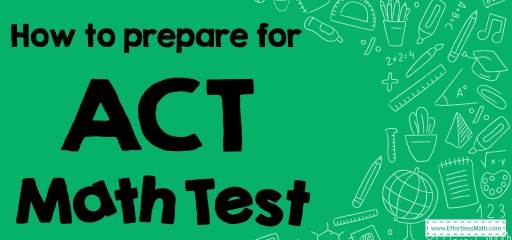
Since 1959, the American College Testing Organization (ACT) has been judging students’ potential regarding academics.
ACT is a standardized test used for college admissions in the United States. In essence, it is a broad and quick assessment of students’ academic abilities.
The ACT is divided into four major segments:
- English
- Reading
- Mathematics
- Science
The ACT also includes an optional 40-minute Writing Test.
In an ACT assessment test, all questions are weighted the same.
You also have to keep in mind that the more difficult questions are randomly thrown around in the test.
You can choose to skip over the more challenging tasks and ace out the simpler questions in the tests first.
There are 60 Mathematics questions on ACT and students have 60 minutes to answer the questions.
The Mathematics section of the ACT contains multiple-choice questions. ACT permits the use of personal calculators on the Math portion of the test.
ACT Mathematics covers the following topics:
- Pre-Algebra (20-25%)
- Elementary Algebra (15-20%)
- Intermediate Algebra (15-20%)
- Coordinate Geometry (15-20%)
- Plane Geometry (20-25%)
- Trigonometry (5-10%)
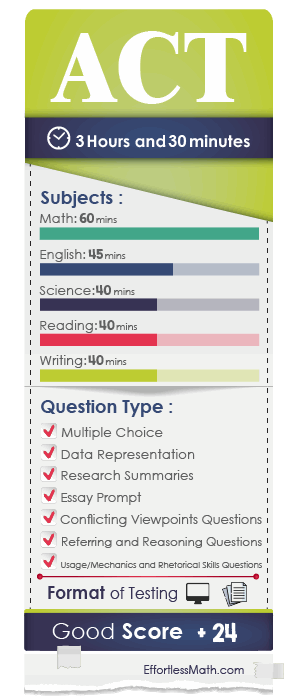
The Absolute Best Book to Ace the ACT Math Test
How to study for the ACT math test?
Some students may think that the ACT is difficult, but they can be assured that with complete mastery of the test resources, proper study method, and accurate practice, not only is it not inaccessible, but students can also achieve a great score.
If you intend to participate in the ACT, here is a step-by-step guide to help you prepare for the ACT math test.
1. Choose your study program
Many useful ACT Math books and study guides can help you prepare for the test.
All major test preparation companies have some offerings for ACT Math, and the short-listing of the best book ends up being a puzzling phenomenon.
There are also many online ACT Math courses.
If you just started preparing for the ACT and you need a good ACT Math prep book, then ACT Math for Beginners The Ultimate Step by Step Guide to Preparing for the ACT Math Test is a perfect and comprehensive prep book for you to master all ACT Math concepts being tested right from scratch.
It will help you brush up on your math skills, boost your confidence, and do your best to succeed on the ACT Math Test.
If you just need an ACT Math workbook to review the math topics on the test and measure your exam readiness, then try: “ACT Math Practice Workbook The Most Comprehensive Review for the Math Section of the ACT Test”
Or if you think you are good at math and just need some ACT Math practice tests, then this book is a perfect ACT Math test book for you: “5 ACT Math Practice Tests Extra Practice to Help Achieve an Excellent Score”
You can also take our FREE
Want to take the ACT Math test in a few weeks or a few days?
Then try: “Prepare for the ACT Math Test in 7 Days: A Quick Study Guide with Two Full-Length ACT Math Practice Tests”.
This quick study guide contains only the most important and vital math concepts an ACT Math test taker will need to succeed on the ACT Math test.
You can also use our FREE ACT Math worksheets: ACT Math Worksheets
Have a look at our FREE ACT Math Worksheets to assess your knowledge of Mathematics, find your weak areas, and learn from your mistakes.
This product is a perfect resource for everything an ACT Math test taker will ever need to ace the ACT Math test.
Take a FREE
ACT Math FREE Resources:
- The Ultimate ACT Math Course
- ACT Math Worksheets
- ACT Math Formulas
- Full-Length ACT Math Practice Test
- FREE ACT Math Practice Test
- Top 10 Free Websites for ACT Math Preparation
2. Think of math positively
The first thing you need is a positive outlook on math. This perspective helps you to accept math problems with an open mind and it prepares you to learn better and thus get a better score on the ACT. So, do not take math as a hassle that you should get rid of as soon as possible.
3. Make the concepts clear
If you have not yet started learning the necessary lessons for the ACT, it is better to start by learning the basic concepts of ACT such as the basic concepts of geometry and the concept of basic pre-algebra, which includes concepts such as fractions, decimals, integers, square roots, ratio, etc.
Once you have prepared for the basic concepts, it’s time to enter the advanced stage of learning, which includes more complex concepts such as elementary algebra, intermediate algebra, coordinate geometry, plane geometry, and trigonometry.
Remember that learning must be step-by-step. If you encounter advanced-level problems without knowing the basic concepts, you will find them difficult and you may become discouraged and frustrated from learning them.
4. Practice daily
No matter how talented you are in math, you need daily practice to improve your skill and speed on the ACT.
The ACT consists of 60 questions that must be answered in 60 minutes.
There is one minute for each question. So, the important thing that makes you successful in this test is the high speed of action and timely decision, which is a skill that can be achieved with daily practice.
Daily practice improves your skills and leads you to your desired score on the ACT.
5. Choose online classes and tutor if you need
There are many ways to prepare for the ACT. For some ACT test-takers, participating in prep classes and using prep books can be effective.
Sometimes, direct learning through tutors speeds up the learning process.
In prep classes, candidates become more familiar with the details of the test and how to prepare for it.
Tutors will guide you through the little things you may not know.
6. Remember the formulas well
Be aware that in the ACT you do not have the right to have formula sheets, so before the exam, you should make sure that you have memorized the necessary formulas for algebra, geometry, and trigonometry. However, this does not mean that you have to worry about not having a formula sheet.
Most of the formulas required in the test are simple formulas that you have probably seen and used many times.
There may be only one or two questions that need a complex formula to solve. So all you need to do is practice enough and keep the formulas in mind.
Remember to review them well the day before the test and make sure you know the uses of each one well. This will help you to remember the formulas well on the day of the test.
7. Take Practice Tests
Once you are ready to test your math skills, it is time to take the simulated practice tests. For this purpose, there are many online and written tests that you can use to strengthen your skills.
These tests simulate the ACT for you and you will find out your strength and weakness.
Of course, you should not forget the time factor in the test. Time is one of the most important factors in the ACT.
As mentioned, in the ACT, each question is given one minute and a total of 60 minutes.
Many candidates cannot get the desired score in the exam due to a lack of management in scheduling.
Participating in a series of simulated tests can greatly reduce this problem.
You need to consider the time during these practice tests and manage the time as well as the test time. This will both strengthen your math skills and help you manage your time, while also boosting your confidence and reducing your stress.
8. Registration process
Once you have completed all the necessary steps to prepare and when you feel ready for the test, visit the ACT website.
You can register online or by mail.
The advantage of registering online is that it is easier and faster. By registering online, you can immediately get acquainted with the details and conditions of the exam and get the appropriate information.
In this way, you can also immediately check whether the test center you want has enough space or not.
Both international students and students in the United States can register online.
To do this you need to create an account on the official ACT website.
After creating an account on the website, you can register.
You will be asked for information about your background and educational condition.
You will also be asked for identity information. You must answer these questions carefully.
During the registration process, you will be asked to specify the time you prefer to take the test.
You can also choose the test center but be careful to act quickly because the capacity of the center you want may be filled very quickly.
Registration time for the ACT exam is usually five weeks and one day before the exam day.
If the registration deadline has passed, do not worry, you can still register late, two weeks after normal registration.
For more detailed information, visit the ACT website.
9. Take the ACT Test
The night before the test, make sure you have the necessary equipment for the test.
You must have the ACT admission ticket with you on the test day. You must print this ticket from the ACT website. This ticket will be sent to you if you have registered for the exam by mail.
In addition, you must have an ID card with you on the day of the exam, such as a driver’s license or a school ID card.
Other items you should bring with you include two pencils, a sharpener, an eraser, a wristwatch for better time management, an acceptable calculator, and a bottle of water for drinking during breaks.
Make sure the calculator you are carrying is allowed by the test center.
You are not allowed to bring a cell phone, personal items, and formula sheets with you to the test room.
Try to be at the test center a little earlier than the test starts.
You have 60 minutes for 60 ACT Math questions.
Do not rush to reach more difficult questions. However, do not waste time on questions that need more thinking. Skip them temporarily and postpone answering them until the end of the test.
Wrong answers do not have a negative marking, so do not leave any questions unanswered.
10. Check your score reports
Scores are usually available two to eight weeks after the test date.
Two weeks after the exam, you must visit the ACT official website and check your account and see if your score is provided.
Scores are processed and added several times a week. If you still have not been able to see your score after two weeks, you should check again later.
It is important to know that the ACT organization prepares three tests for each test taker.
First, student reports which students receive two to eight weeks after the exam in ACT personal account.
Second, a high school report will be sent to the school if the student allows this when enrolling, which includes scores and planning information about college and career.
The school keeps this information in the student’s admission profile.
A college report will be sent to the college that the student has selected. In addition to ACT scores, this report may also include information about the student’s grades and performance in the classes and predictions about his or her performance in college.
11. Interpretation of ACT scores
The ACT Math score range is from 1-36. As you know, a higher score indicates your better performance on the test.
This score compares your overall performance to the performance of the other test-takers.
Most test-takers are in the middle range, and candidates are less likely to score too high or too low.
The average score of the students in ACT Math is 20.8. This means that if you get a score of 21, you get a score higher than fifty percent of the participants.
If you score 30 on the test, you performed better than 93% of the candidates on the test. And as you can see, a score below 20 is not a very strong score.
A score above 35 is in the 99th percentile. You should know that in the middle of the scale, that is, around a score of 20, each two more scores make a 24% percent change. That means changing your score from 18 to 22 will move you from the 40th to 64th percentile.
But from 24 to 28, it only increases your percentile by 14%, and from 30 to 34, it only increases by 6%.
The Best ACT Quick Study Guide:
ACT FAQs:
Some common questions about the ACT:
What Math concepts are on the ACT?
The ACT questions are from six areas of math that most 11th graders are familiar with: Pre-Algebra (20-22%), Elementary Algebra (18-20%), Intermediate Algebra (15-20%), Coordinate Geometry (15-20%), Plane Geometry (20-25%), Trigonometry (5-10%).
Is the ACT multiple-choice?
Yes, this test consists of four multiple-choice sections: English, Reading, Mathematics, and Science. There is also a selective section for writing.
Is the ACT or SAT math harder?
The answer to this question depends on the student. Neither of these two tests is more difficult than the other. Some students may find one of these two tests more difficult than the other.
What grade level math is on the ACT?
ACT math covers all math topics up to the end of grade eleven
How do I pass the ACT math test?
There are tips that if you follow, you can easily get an acceptable score on ACT Math.
The most important thing is practicing consistently to improve your Math skills and the speed of responding to math questions, identifying weaknesses, and eliminating them.
Will a 36 ACT get you into Harvard?
Although it is not easy to get a grade of 36 on ACT, getting it does not mean getting into Harvard.
Only a small percentage of those who get a full score on the ACT or SAT can go to elite colleges like Harvard.
Do ACT math questions get harder?
No! The ACT Math test is not ordered by difficulty. However, the easy math questions will appear mostly at the beginning of the test, while harder questions will be towards the end of the test.
Out of 60 ACT Math questions, about 20 questions are considered to be difficult.
Is a 33 on the ACT good?
For most students, a score above 21 is a good score. A score above 30 is required for those who want to be admitted to an elite college.
Is a 17 on the ACT good or bad?
A score below 20 on the ACT is below average and not a strong score. To ensure admission to reputable colleges, it is best to raise the ACT score above 17,
Is there calculus on the ACT?
No! There is no Calculus question on the ACT. You do not need to know any calculus to get a good score on the ACT Math test.
Is there Algebra 2 on the ACT?
Yes! There are a few Algebra 2 questions on the ACT Math test. Around 15% to 20% of the questions are from Intermediate Algebra.
How much geometry is on the ACT?
Between 35% and 45% of ACT math questions are geometry, which is about 21 to 27 questions out of 60 ACT Math questions. Coordinate Geometry (15-20%) and Plane Geometry (20-25%).
How difficult is the ACT?
The ACT is not a difficult test at all it is a straightforward test. Like any other test, if you know the tricks, you can get the score you want on the test.
How do you get a 30 or more on ACT math?
If you want to score above 30 on the ACT, you are only allowed to miss a few questions in each section. You must score at least 30 in two sections and a composite score of 29.5 or higher.
How many questions can you miss and still get a 36 on the ACT?
If you want to get a composite score of 36, you are allowed to miss a maximum of two questions on the ACT.
College Entrance Tests
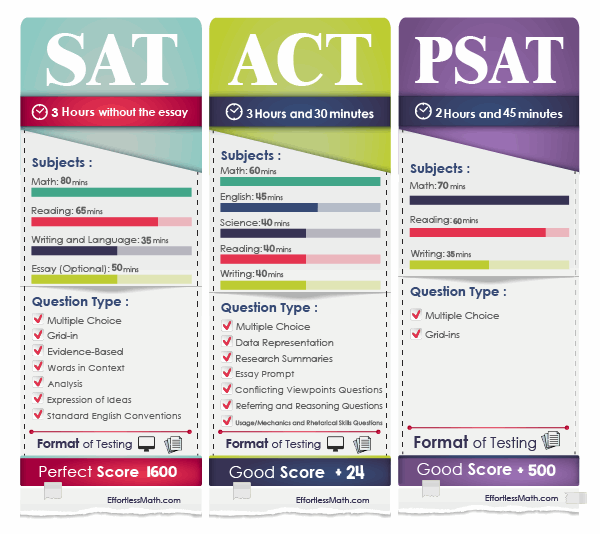
The Best Books to Ace the ACT Math Test
More from Effortless Math for ACT Test …
Looking for FREE ACT Math websites to find free online resources?
Here is our complete list of Top 10 Free Websites for ACT Math Preparation.
Need a practice test to help you improve your ACT Math score?
Have a look at our Full-Length ACT Math Practice Test and Free ACT Math Practice Test.
Do you know the key differences between SAT Math and ACT Math?
Find your answer here: SAT Math vs. ACT Math: the key differences.
The Perfect Prep Books for the ACT Math Test
Have any questions about the ACT Test?
Write your questions about the ACT or any other topics below and we’ll reply!
Related to This Article
More math articles
- Full-Length 7th Grade Common Core Math Practice Test-Answers and Explanations
- Using Algebra Tiles to Model and Solve Equations
- How to Solve Two-variable Linear Equations Word Problems
- Treasure Hunt in Geometry: How to Navigate Through Polygons’ Scale Drawings
- 7th Grade NYSE Math FREE Sample Practice Questions
- Stay Calm: 7 Working Techniques To Overcome Exam Nerves
- PERT Math FREE Sample Practice Questions
- How to Solve Pythagorean Theorem Word Problems
- CLEP College Math Practice Test Questions
- What Kind of Math Is on the ATI TEAS 7 Test?
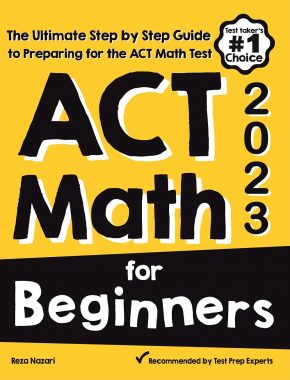
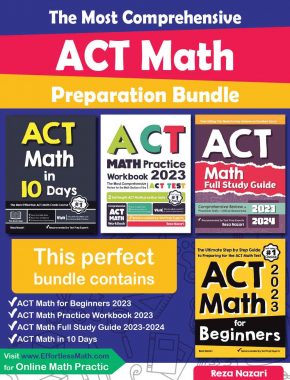
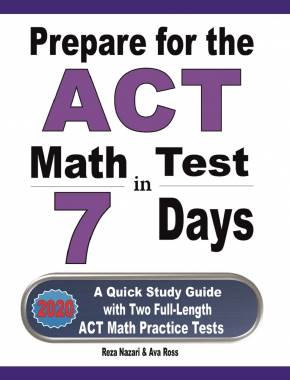
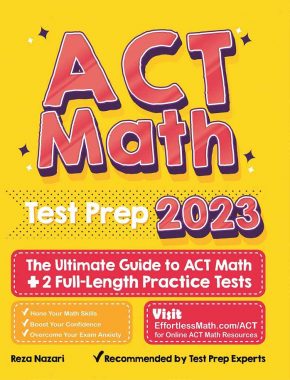
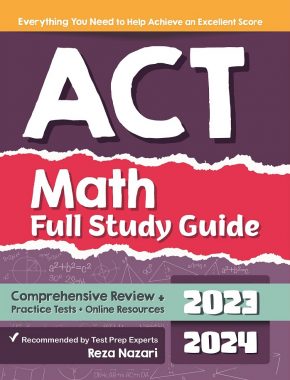
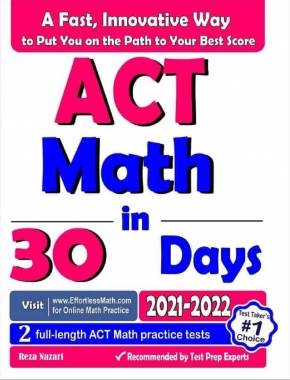
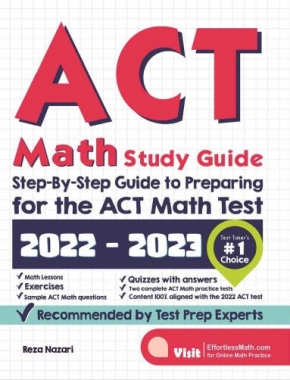
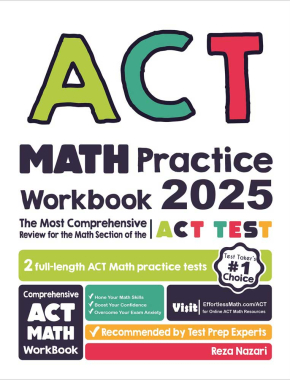
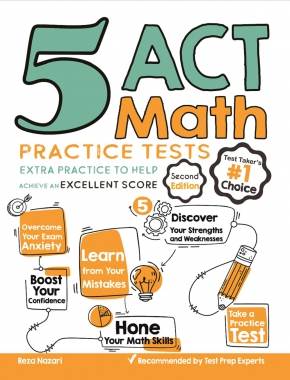
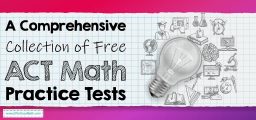
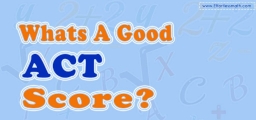
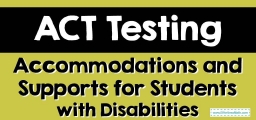


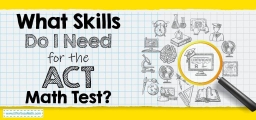
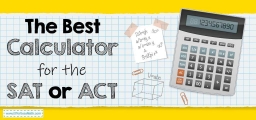
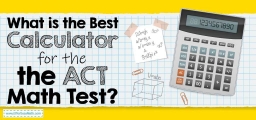
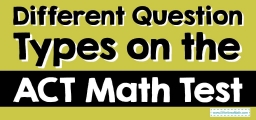

What people say about "How to Prepare for the ACT Math Test? - Effortless Math: We Help Students Learn to LOVE Mathematics"?
No one replied yet.